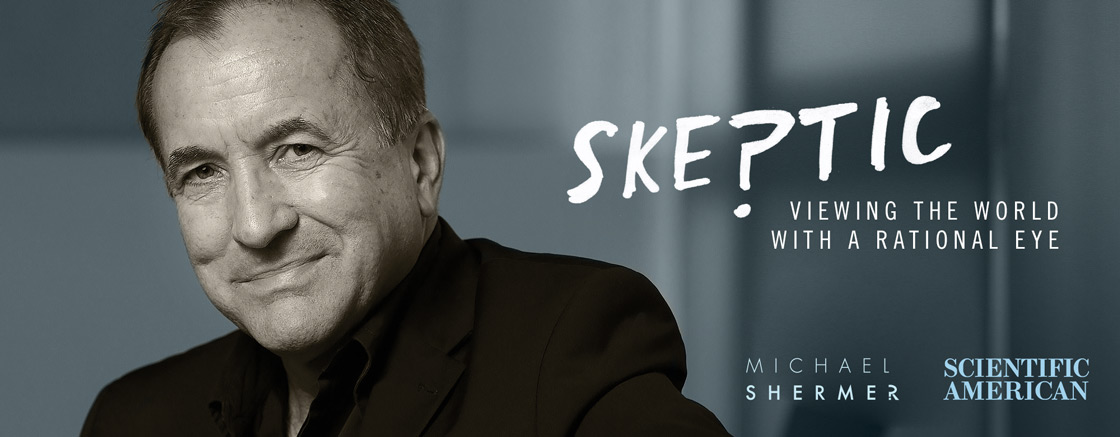journalism
An Unscientific American
Editor-in-chief Laura Helmuth’s departure from ‘Scientific American’ last week is an object lesson in the dangers of mixing facts and ideology.

The day after the 2024 election, journalist Paul D. Thacker posted on his X account a series of expletive-filled posts from Laura Helmuth’s Bluesky account, in which she apologised “to younger voters that my Gen X is so full of fucking fascists,” upbraided high-school classmates for celebrating Trump’s win—“fuck them to the moon and back”—and described her home state of Indiana as “racist and sexist.”

Series of posts by Scientific American's Laura Helmuth who turned America's oldest magazine into her personal political blog of bigotry and hate.
— Paul D. Thacker (@thackerpd) November 6, 2024
When you're so disconnected from American reality don't be shocked that trust in your magazine evaporates.
Science is not politics. pic.twitter.com/kgsCEUIomU
The ensuing media firestorm led Helmuth to delete the comments and offer an unconvincing apology for her “offensive and inappropriate posts,” asserting that she ‘respects and values people across the political spectrum’ and remains “committed to civil communication and editorial objectivity.”
— Laura Helmuth (@laurahelmuth.bsky.social) 2024-11-07T17:49:50.644Z
Even Elon Musk got in on the pile-on after Helmuth asked for advice on what workplaces could do to help people “devastated” by the election results—implying that her colleagues had all voted Democrat.
Any advice for what workplaces can do to help people who are devastated by the election? Thanks so much.
— Laura Helmuth (@laurahelmuth.bsky.social) 2024-11-06T15:55:04.371Z
The latter https://t.co/nXvdFV1Dwn
— Elon Musk (@elonmusk) November 12, 2024
Shortly afterwards, the president of Scientific American, Kimberly Lau, released the following public statement:
Laura Helmuth has decided to move on from her position as editor in chief of Scientific American. We thank Laura for her four years leading Scientific American during which time the magazine won major science communications awards and saw the establishment of a reimagined digital newsroom. We wish her well for the future.
Helmuth made her own announcement on Bluesky, stating that she had “decided to leave Scientific American after an exciting 4.5 years” and was “going to take some time to think about what comes next (and go birdwatching).” Birdwatching here is the equivalent of an embattled politician who resigns in order to “spend more time with my family.” The pretext fools no one, but is plausible enough that the proclaimer may hope readers will believe that other people believe it.
I’ve decided to leave Scientific American after an exciting 4.5 years as editor in chief. I’m going to take some time to think about what comes next (and go birdwatching), but for now I’d like to share a very small sample of the work I’ve been so proud to support (thread)
— Laura Helmuth (@laurahelmuth.bsky.social) 2024-11-14T19:23:01.434Z
I was a monthly columnist at Scientific American for nearly 18 years. On hearing this news, I emailed a number of people associated with the magazine to inquire what had transpired there—and more broadly why they think Helmuth and others allowed, or even encouraged, far-left politics to intrude into the pages of that once-storied publication. Very few people responded and those who did not only offered no comment but asked me to not even mention the fact that I had contacted them. What is going on here?
In his 2008 book The Stuff of Thought: Language as a Window into Human Nature, psychologist Steven Pinker notes:
Merely being asked certain questions can put a person at a disadvantage, since one answer might be damaging, the other would be a lie, and a refusal to answer would be a de facto confession that those are the respondent’s two options. Witnesses who exercise their Fifth Amendment right against self-incrimination by refusing to answer a question often do incriminate themselves in the court of public opinion.
I asked Pinker how this might apply to this specific case. He responded by email:
[C]ommunication takes place on two levels: the content of the message, and the common knowledge that stating the message generates. A source that ratifies what you (and the world) already know—that Helmuth was temperamentally unqualified for the job and damaged the institution, while they went along with it—would be confessing their own lack of integrity and courage, together with their willingness to kick a former colleague while she’s down. On the other hand, they could not deny it without forfeiting all claims to credibility and honesty. And by saying “no comment” they’d be acknowledging (that is, generating common knowledge) that those were their two options.
There is an additional factor at work here, of course: left-wing political bias. Imagine what would have happened if the editor-in-chief of Scientific American had spoken about or published articles on the average difference in IQ test scores between white and black Americans and argued that the gap might be partially due to genetics—or, alternatively, if she had correctly stated that, on average, women score higher than men in trait Neuroticism on the Big 5 personality scale and suggested that that is why there are fewer female than male Fortune 500 CEOs. She would surely have been summarily fired and publicly denounced and we would have been told that such comments or articles “do not reflect the positions or policies of Scientific American or its governing board or staff; we apologise to all who have been harmed by them.” She would almost certainly not have been thanked for her years of loyal service and offered good wishes for her future.
The ideological capture of the publication began years before Laura Helmuth took the helm in 2020, as I documented in my first Skeptic Substack column.

I wrote 214 consecutive monthly columns for Sci Am, from 2001–19. Only two of these were rejected, both in 2018. One, on “The Fallacy of Excluded Exceptions,” argued that sexually abusive parents have not always been victims of childhood sexual abuse themselves. As I explain, counterfactual examples refute the hypothesis that being an abuser can be attributed to having experienced abuse oneself. There are sexually abusive parents who were never abused as children, and there are abused children who grow up to be loving, non-abusive parents. But my editor rejected the article on the grounds that “we’re unwilling to publish a piece that suggests… that sexual harassment and the phenomenon of abused children growing up to be abusers are less of a problem than most people imagine.” This response misses the point entirely, as I explained to him at the time:
I understand why we need to be sensitive to victims of abuse, but from a purely scientific hypothesis-testing perspective, it doesn’t serve society to refuse to consider the other cells in the matrix that contain disconfirming evidence of the hypothesis just because someone is committed to the hypothesis that abused children grow up to be abusers, and abusive adults were abused as children. The evidence shows otherwise. It should be okay to point that out.
He still found the thesis unacceptable and I had to revise the column into its much blander published version.

Sci Am also rejected my next column—“Dreams Deferred”—which was ultimately published here in Quillette. In that piece, I argue that Dr Martin Luther King Jr.’s dream that “my four little children will one day live in a nation where they will not be judged by the color of their skin but by the content of their character,” is now being undermined by identity politics, which I describe as “the collectivization of individuals into groups competing for status and power,” not only by race but also by gender identity, sexual orientation, class, religion, ethnicity, language, dialect, education, generation, occupation, political party, disability, marital status, and more. “The division of people into such aggregate identities is a perverse inversion of Dr. King’s dream,” I write. The editor summarised the argument of this piece as “everything is wonderful and everyone should all stop whining” (which is not at all what I wrote) and asked me to submit an entirely new column on a completely different topic.
Historian Robert Conquest once observed that “any organization not explicitly right-wing sooner or later becomes left-wing.” I would modify this slightly: Any organisation that is not explicitly politically neutral eventually drifts to the political left. This tendency has been apparent at Scientific American for some time now. The following articles were all published under Laura Helmuth’s editorship.

In “Denial of Evolution Is a Form of White Supremacy” (5 July 2021), author Allison Hopper asserts that creationists are ipso facto white supremacists because in the Genesis story of Cain and Abel, Cain is punished for his fratricide by “a darkening of his descendants’ skin.” However, this is not how mainstream creationists interpret that passage and, indeed, polls consistently show a larger percentage of blacks than whites hold creationist beliefs, motivated in this by religious faith, not racism.
“Modern Mathematics Confronts its White Patriarchal Past” (12 August 2021) asserts that the reason why women and black people are underrepresented in mathematics departments is because of misogyny and racism. This ignores the gender and racial imbalance among applicants for such jobs. As a 2019 Women in Mathematics survey points out, “senior faculty composition both reflects the BA and PhD pipeline of prior years, and also influences the gender composition of new graduates.” In addition, men do not dominate all academic fields. In fact, a 2019 Council of Graduate Schools study found that—for the eleventh year in a row—women earned more doctoral degrees at US universities than men (41,943 vs. 37,365, i.e. 52.9 vs. 47.1 percent). Although women make up a smaller proportion of doctorates in engineering (25.1 percent), mathematics and computer sciences (26.8 percent), physical and earth sciences (35.1 percent), and business (46.7 percent), they outnumber men in public administration (73.6 percent), health and medical sciences (71 percent), education (68.4 percent), social and behavioural sciences (61 percent), arts and humanities (51.9 percent), and biological sciences (51.4 percent). Are we to believe that patriarchy and misogyny exist only in some fields but not others?
In “The Complicated Legacy of E. O. Wilson” (29 December 2021), published three days after the renowned evolutionary biologist’s death at the age of 92, author Monica R. McLemore writes that “we must reckon with his and other scientists’ racist ideas if we want an equitable future.” This calumny against one of the greatest scientists of the twentieth century was so egregious that it caused a cavalcade of Wilson’s colleagues, post-docs, students, friends, and supporters to come to his defence.

“The Theory That Men Evolved to Hunt and Women Evolved to Gather is Wrong” (1 November 2023) ignores the fact that a comprehensive overview of all studies has shown that only 6–16 percent of hunter-gatherer societies “show signs of female hunting with any regularity” and that “even in societies where women hunt, they hunt to a much lesser extent than do men.” The authors extrapolate from the almost certainly false idea that prehistoric women hunted as much as men did to the conclusion that “[i]nequity between male and female athletes is a result not of inherent biological differences between the sexes but of biases in how they are treated in sports.” This is pure blank slate pablum, which can be controverted by a single observation: As she herself has admitted, Serena Williams would not be able to beat any of the top 100 male tennis players.
Perhaps the most absurd of these articles is “Why the Term ‘JEDI’ is Problematic for Describing Programs that Promote Justice, Equity, Diversity and Inclusion” (23 September 2021). The authors argue:
Although they’re ostensibly heroes within the Star Wars universe, the Jedi are inappropriate symbols for justice work. They are a religious order of intergalactic police-monks, prone to (white) saviorism and toxically masculine approaches to conflict resolution (violent duels with phallic lightsabers, gaslighting by means of “Jedi mind tricks,” etc.). The Jedi are also an exclusionary cult, membership to which is partly predicated on the possession of heightened psychic and physical abilities (or “Force-sensitivity”). Strikingly, Force-wielding talents are narratively explained in Star Wars not merely in spiritual terms but also in ableist and eugenic ones: These supernatural powers are naturalized as biological, hereditary attributes.
Phallic lightsabers?
Then there were the public endorsements of presidential candidates Joe Biden and Kamala Harris and—as if all this were not problematic enough for a magazine with the word “scientific” in its title—the editors threw their weight behind the youth gender medicine and trans lobby, claiming that gender-affirming care for trans kids is good health care (it isn’t), that “rapid onset gender dysphoria” is not a thing (it most certainly is), and that biological sex is on a spectrum (it is binary). Numerous scientists published rebuttals of these dubious claims, including evolutionary theorist Richard Dawkins and biologist Colin Wright.

As investigative journalist Jesse Singal argues:
Scientific American has hermetically sealed itself and its readers inside a comforting, delusional cocoon in which we know youth gender medicine works, beyond a shadow of a doubt, and only bigots and ignoramuses suggest otherwise. Over and over, SciAm simply took what certain activist groups were saying about these treatments and repeated it, basically verbatim, effectively laundering medical misinformation and providing it with the imprimatur of a highly regarded science magazine.
When Wright corrected birdwatching enthusiast Helmuth’s claim that white-throated sparrows (Zonotrichia albicollis) have four sexes, she simply blocked him:
Laura Helmuth, who just resigned as Editor-in-Chief from Scientific American, once absurdly claimed that white-throated sparrows had 4 sexes.
— Colin Wright (@SwipeWright) November 14, 2024
When I corrected her on this point, she blocked me. pic.twitter.com/o9rVsrxWeR
Does anyone actually believe such things? It seems some do and Laura Helmuth appears to be one of them. That is the most charitable assessment I can make of what has happened to the publication that inspired a dozen generations of budding scientists, technologists, engineers, mathematicians, and scholars. As in other science publications, along with mainstream media outlets, some corporations, and nearly all academic institutions, the people promulgating these woke ideas are mostly true believers—and the fervour of their faith only makes them all the more able to convince themselves of the truth of claims that everyone else can see have little-to-no contact with reality. Men do not menstruate and cannot get pregnant; women do not have penises and do not produce sperm; and transwomen—who are men—do not belong in women’s sports, locker rooms, bathrooms, prisons, or any other spaces designated for women only. No amount of ideological wishful thinking will change this.
Perhaps some—or even most—of the staff at Scientific American and other similar institutions do not support these ideological contaminations of science; they just want to go about their lives without being harassed by activists. Some may be virtue signalling without actually believing in any of the nonsense they are spouting, while others may be opportunists, capitalising on pluralistic ignorance: i.e. the fact that each individual is under the illusion that everyone else believes such shibboleths as the idea that human beings have more than two sexes (although, in fact, most people do not).
But the social environment is rapidly changing. Thanks to Donald Trump’s election, together with relentless pushback from political centrists and old-school liberals who are sick of being harangued by overzealous activists who accuse anyone who disagrees with them of bigotry, the pendulum may at long last be starting to swing back towards normalcy. Election postmortems and surveys have consistently identified the fact-free ideological capture of the Democratic party as a major factor in their defeat. The Left is in dire need of a course correction. Will that happen? Given what we know about the power of irrational belief, I am not at all confident that it will. Let’s hope I’m wrong, though—not only for the sake of the future of a once-great magazine, but for the sake of the American nation.
Erratum Notice: An earlier version of this article erroneously attributed a quotation from Serena Williams to her sister, Venus.






